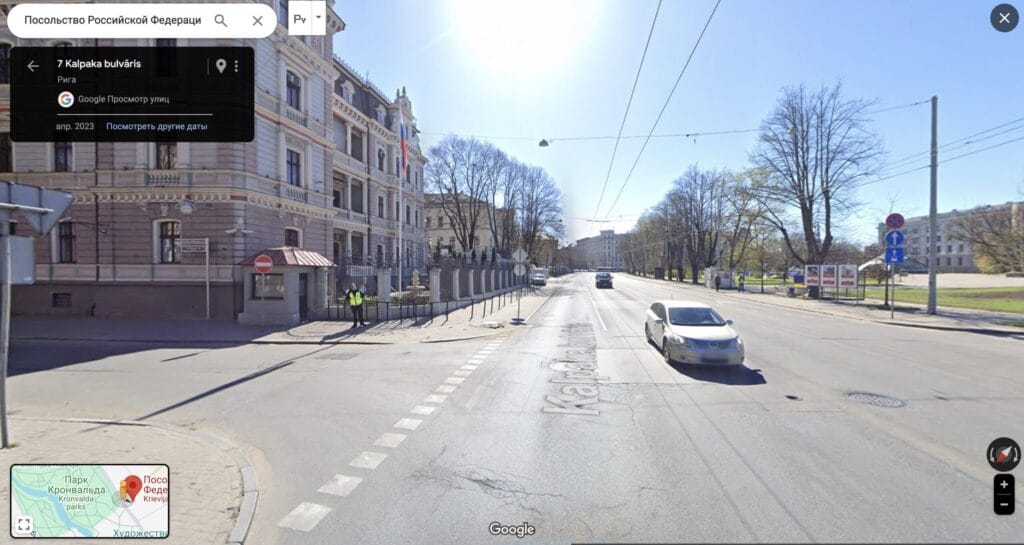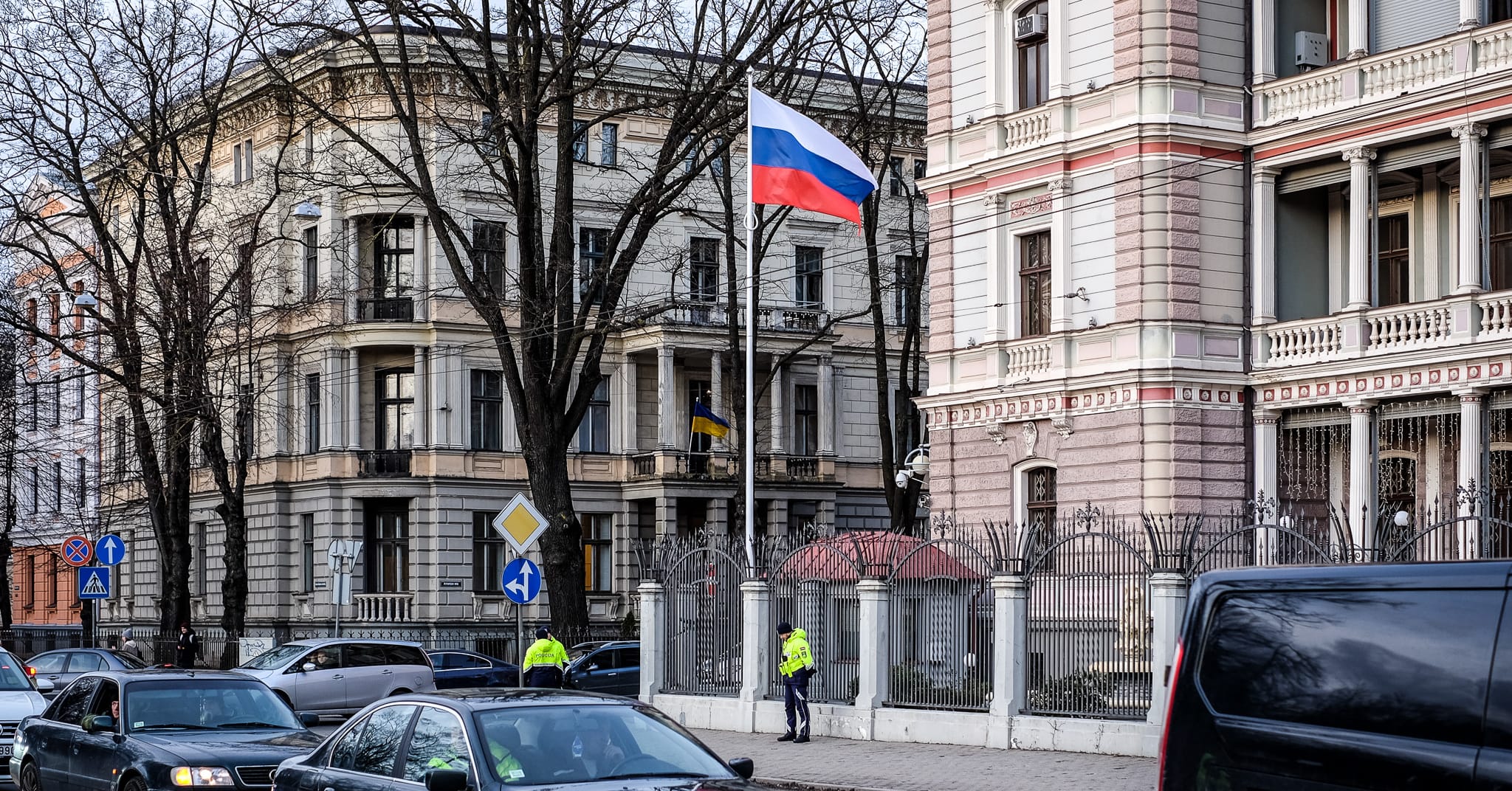After the attack on the Crocus City Hall concert hall on March 22, a message circulated in the media and social networks that the Latvian authorities did not allow Riga residents to organize a memorial near the walls of the Russian diplomatic mission. We have verified the veracity of this statement.
On the evening of March 22, armed people burst in to the Crocus City Hall concert hall in Krasnogorsk near Moscow, where the Picnic group was to perform. The attackers opened fire on spectators and site staff, and several explosions were reported. As a result of a fire started by terrorists, the building caught fire and the roof over the auditorium collapsed. At least 137 people were killed in the attack, and another 182 were injured.
A day later, the Russian state news agency TASS, citing the Russian Embassy in Riga reportedthat the Latvian police prohibited local residents from bringing flowers to the diplomatic mission building in memory of the victims. “As a sign of support for Russia and the families of those killed as a result of the tragic events in the Moscow region, hundreds of Latvian residents who share the pain of our people continue to bring flowers and lamps to the walls of the embassy in Riga. But the local “guardians of order,” apparently, do not know such concepts as compassion and sympathy for the grief of others - the Latvian police prohibit concerned citizens from approaching the diplomatic mission building in order to honor the memory of the victims of the monstrous terrorist attack,” the agency quotes the diplomats’ statement.
Similar notes were published by other major Russian media, including “Russian newspaper", "Komsomolskaya Pravda" And Lenta.ru. Other publications, including "RIA Novosti", "Arguments and facts" And "Gazeta.ru", they clarified that a spontaneous memorial nevertheless appeared across the road from the embassy. The Izvestia newspaper, on the contrary, with reference to social network users reportedthat the memorial was destroyed by police.
Publications reporting on the ban imposed by the Riga police most often refer to one of two sources: publication Russian Embassy on Facebook and fast diplomatic missions on Telegram. The first entry appeared on March 23 at 17:20 Moscow time, the second on the same day at 16:35.
TASS cited only the first two paragraphs from these posts. The diplomatic mission further indicated: “As a result, people had to organize a spontaneous memorial on the opposite side of the street - across the road from the embassy among the anti-Russian “exhibits” placed there by Latvian nationalists and Russophobes.”
The Latvian media also reported that Riga residents bring flowers to the Russian embassy building. In particular, on March 23 at 17:59 Delfi portal published video filmed across the street from the diplomatic mission building. It shows people laying flowers. “Earlier, a number of Telegram channels reported that police allegedly prohibit carrying flowers and candles. This is not so,” the journalists emphasize. From the video it follows that law enforcement officers are located directly next to the diplomatic mission building and do not interfere with the laying of flowers on the opposite side of the street. Two hours earlier, a selection of footage from this place posted in its Telegram channel, the publication “Volna”, the next morning photographs And video shared by TVNet.
“Volna” clarifies in its post that the memorial to Alexei Navalny, who died in the colony on February 16, located in the same place, “has been moved to the lawn nearby” (this can be seen in one of the photographs). However, in other countries, flowers and candles in memory of the Russian politician both on the day of his death and on the day of his funeral are often left right next to the walls or at the fence diplomatic missions of the Russian Federation.
The fact is that since the end of February 2022, in principle, no one except diplomats and visitors to the consular department are allowed near the Russian embassy in Riga, and any events, regardless of the position and purpose of the organizers, take place opposite, on the square near the Congress House across Kalpaka Boulevard. It was there that they were organized memory shares Navalny, solidarity events with Ukraine and pickets against the Kremlin's interference in the internal affairs of Latvia. In the square across the street from the embassy recently were placed and posters in support of Ukraine.
The Delfi portal, at the request of “Verified”, turned to the Latvian police for comment. The head of the press center of the Latvian State Police, Simona Gravite, explained that since the beginning of the full-scale Russian invasion of Ukraine, it is not allowed to place flowers or any other objects near the embassies of both countries in Riga. “This is done for the safety of the embassies themselves,” Gravite emphasized. The constant presence of police at diplomatic mission buildings is confirmed by journalists living in Riga interviewed by Verified.
“Given this aspect, on the opposite side of the street all this time, for example, they have been expressing support for Ukraine. And this weekend, the police did not create obstacles or restrictions for laying flowers in front of the Russian Embassy as a sign of memory and expression of sympathy for those killed in Russia. The police do not interfere with laying flowers in an authorized place if this is done with respect for others and without causing damage to objects of the urban environment,” said a representative of the Latvian police.

Law enforcement agencies, Gravite noted, at the same time ensure public order and safety, as well as compliance with the laws of the republic: “The police have a strict position against those who use this event to enter into conflict with others, are intoxicated and cause damage to the urban environment, and also try to glorify military aggression or war. This is unacceptable and will not be tolerated in the future.”
Thus, the TASS agency and a number of other media incorrectly conveyed the original messages of the Russian Embassy in Riga - the police officers on duty at the diplomatic mission building did not prohibit publicly expressing sympathy for the victims of the terrorist attack in Crocus. The employees of the embassy itself, who manage its accounts on social networks, deliberately distorted the reality - diplomatic workers are well aware that for two years there have been law enforcement officers on duty near the building, who do not allow any objects to be left near the walls or the fence. The use of the verb “had to” in relation to Riga residents who wanted to organize a memorial directly at the embassy, but did it across the road, seems manipulative - this word is true for participants in any actions at the Russian embassy in Riga, regardless of the purpose of the event.
“Verified” thanks the journalists of the Russian-language version of the portal Delfi.lv for help in preparing this analysis.
Cover photo: Viesturs Radovics / Delfi
- BBC Russian service. Why did IS attack a concert hall in Moscow? What experts say about the goals of the Islamic State
- Is it true that singing “Katyusha” was banned in Latvia?
If you find a spelling or grammatical error, please let us know by highlighting the error text and clicking Ctrl+Enter.






